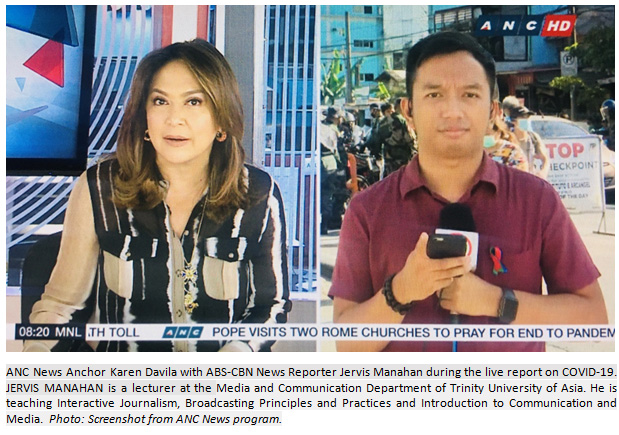Media Profession is a Life Mission: COVID-19 may Possibly Kill More Filipinos without Journalists as Frontliners

CORRESPONDENCE by Jervis Manahan—The year 2020 marks the history of the world with all the disturbances it made to global society. We kickstarted the year with heavy issues like the US killing of a top Iranian military general, the bushfires of Australia, and in the Philippines, the eruption of Taal Volcano. The first month alone felt like a year, but we haven’t even braced ourselves with the big challenges to come.
What made the biggest impact in human life this year, so far, is the pandemic we are currently facing, the COVID19.
The global number of deaths has already breached a terrifying 120,000: mostly coming from strong nations and world superpowers like the US, China, and the countries of Europe. Who would have thought that a virus, an unseen enemy, can rock even the most stable countries in the world? No government, no matter how strong, can claim to have been prepared for a tough problem like this one.
With the rising number of fatalities, world governments had to impose drastic measures, and the usual cycle of life has stopped in many parts of the planet. The Philippines, of course, was not spared. In Southeast Asia, we are so far registering the most number of confirmed cases, and we have the second highest number of deaths, just next to Indonesia.
But what is appaling is that as the virus spread around the world, disinformation also spread quite as fast. COVID19 has become a litmus test of media literacy among the world population. Even before scientific data and validated information were announced by credible organizations, links to fake health news were already passed from one group chat to another. It’s very dangerous; sometimes even life threatening, when we pass health related misinformation to other people. This may even cost us our lives.
This quick spread of disinformation highlights the importance of media practitioners as frontliners, or frontline supporters, of this crisis. Now, more than ever, people need reliable news and information for them to make sound decisions in their everyday lives. The world is veiled with fear because a new virus threatens lives in every home, but the first shield they can have is access to timely and credible information.
In the Philippines, even the biggest news organizations have been affected by the threat of COVID19. Journalists are not immune to viruses, and as Luzon went into lockdown, networks and news organizations scaled their operations down. The things that were once unthinkable in the media happened: news reporters and anchors broadcasting from home, press conferences going virtual, and the entertainment industry stopping from taping new shows. Many programs went off the air. This is something unprecedented in the recent history of Philippine radio and television, at least post Martial Law.
COVID19 has posed very complex problems and no one sector can claim to have the power to solve this crisis. Health workers, supermarket employees, peace keepers, the government officials, and the media have to always do their part for us to survive the pandemic. Difficult choices and strategies have to be made, people were locked down their homes, the economy is close to frozen, but the need for news and information will always be there. It’s a public need that has to be satisfied; thus, the inclusion of media as essential workers. Factual stories are very important at this time.
Despite the seemingly insurmountable challenges, the Philippine media did not stop reporting the truth. Everyday, hundreds of reporters still gather and verify information for public consumption. Some journalists remain in fieldwork, while some gather information from home. The risks are of great magnitude but a lot of media workers: producers, editors, writers, reporters, artists, sound engineers, among others, still go to work. Because for those in the media, it’s a life mission to continue bringing the truth to every household, more especially at a time of a pandemic. The methods may have changed, but the commitment to tell stories and truth will never cease.
This is not to glorify media workers as heroes of the crisis. We do not directly save lives of those who are sick. But our stories are needed to keep the audiences informed. And if we have informed citizenry, we can better withstand the challenges of this pandemic.
Because for those in the media, it’s a life mission to continue bringing the truth to every household, more especially at a time of a pandemic. The methods may have changed, but the commitment to tell stories and truth will never fade.


 The Trinitian Center for Community Development is the official arm for Community Extension Service that supports Trinity University of Asia in carrying out its Vision and Mission of involving her constituents to live a LIFE that is GOD-centered and in service to the community.
The Trinitian Center for Community Development is the official arm for Community Extension Service that supports Trinity University of Asia in carrying out its Vision and Mission of involving her constituents to live a LIFE that is GOD-centered and in service to the community.
